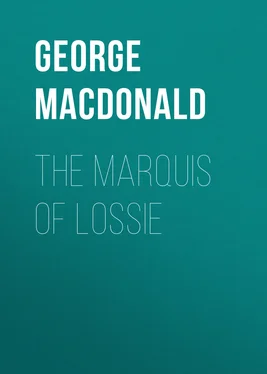George MacDonald - The Marquis of Lossie
Здесь есть возможность читать онлайн «George MacDonald - The Marquis of Lossie» — ознакомительный отрывок электронной книги совершенно бесплатно, а после прочтения отрывка купить полную версию. В некоторых случаях можно слушать аудио, скачать через торрент в формате fb2 и присутствует краткое содержание. Жанр: foreign_prose, foreign_religion, foreign_antique, на английском языке. Описание произведения, (предисловие) а так же отзывы посетителей доступны на портале библиотеки ЛибКат.
- Название:The Marquis of Lossie
- Автор:
- Жанр:
- Год:неизвестен
- ISBN:нет данных
- Рейтинг книги:3 / 5. Голосов: 1
-
Избранное:Добавить в избранное
- Отзывы:
-
Ваша оценка:
- 60
- 1
- 2
- 3
- 4
- 5
The Marquis of Lossie: краткое содержание, описание и аннотация
Предлагаем к чтению аннотацию, описание, краткое содержание или предисловие (зависит от того, что написал сам автор книги «The Marquis of Lossie»). Если вы не нашли необходимую информацию о книге — напишите в комментариях, мы постараемся отыскать её.
The Marquis of Lossie — читать онлайн ознакомительный отрывок
Ниже представлен текст книги, разбитый по страницам. Система сохранения места последней прочитанной страницы, позволяет с удобством читать онлайн бесплатно книгу «The Marquis of Lossie», без необходимости каждый раз заново искать на чём Вы остановились. Поставьте закладку, и сможете в любой момент перейти на страницу, на которой закончили чтение.
Интервал:
Закладка:
The prejudice against Malcolm from his imagined behaviour to Lizzy Findlay, had by this time, partly through the assurances of Peter, partly through the power of the youth's innocent presence, almost died out, and when the two men reached the Seaton, they found plenty of hands ready to help them to reach the little sloop. Malcolm said he was going to take her to Peterhead, and they asked no questions but such as he contrived to answer with truth, or to leave unanswered. Once afloat, there was very little to be done to her, for she had been laid up in perfect condition, and as soon as Mrs Mair appeared with her basket, and they had put that, a keg of water, some fishing lines, and a pan of mussels for bait, on board, they were ready to sail, and wished their friends a light goodbye, leaving them to imagine they were gone but for a day or two, probably on some business of Mr Crathie's.
With the wind from the northwest, they soon reached Duff Harbour, where Malcolm went on shore and saw Mr Soutar. He, with a landsman's prejudice, made strenuous objections to such a mad prank as sailing to London at that time of the year, but in vain. Malcolm saw nothing mad in it, and the lawyer had to admit he ought to know best. He brought on board with him a lad of Peter's acquaintance, and now fully manned, they set sail again, and by the time the sun appeared were not far from Peterhead.
Malcolm's spirits kept rising as they bowled along over the bright cold waters. He never felt so capable as when at sea. His energies had been first called out in combat with the elements, and hence he always felt strongest, most at home, and surest of himself on the water. Young as he was, however, such had been his training under Mr Graham, that a large part of this elevation of spirit was owing to an unreasoned sense of being there more immediately in the hands of God. Later in life, he interpreted the mental condition thus – that of course he was always and in every place equally in God's hands, but that at sea he felt the truth more keenly. Where a man has nothing firm under him, where his life depends on winds invisible and waters unstable, where a single movement may be death, he learns to feel what is at the same time just as true every night he spends asleep in the bed in which generations have slept before him, or any sunny hour he spends walking over ancestral acres.
They put in at Peterhead, purchased a few provisions, and again set sail.
And now it seemed to Malcolm that he must soon come to a conclusion as to the steps he must take when he reached London. But think as he would, he could plan nothing beyond finding out where his sister lived, going to look at the house, and getting into it if he might. Nor could his companion help him with any suggestions, and indeed he could not talk much with him because of the presence of Davy, a rough, round eyed, red haired young Scot, of the dull invaluable class that can only do what they are told, but do that to the extent of their faculty.
They knew all the coast as far as the Frith of Forth; after that they had to be more careful. They had no charts on board, nor could have made much use of any. But the wind continued favourable, and the weather cold, bright, and full of life. They spoke many coasters on their way, and received many directions.
Off the Nore they had rough weather, and had to stand off and on for a day and a night till it moderated. Then they spoke a fishing boat, took a pilot on board, and were soon in smooth water. More and more they wondered as the channel narrowed, and ended their voyage at length below London Bridge, in a very jungle of masts.
CHAPTER IX: LONDON STREETS
Leaving Davy to keep the sloop, the two fishermen went on shore. Passing from the narrow precincts of the river, they found themselves at once in the roar of London city. Stunned at first, then excited, then bewildered, then dazed, without plan to guide their steps, they wandered about until, unused to the hard stones, their feet ached. It was a dull day in March. A keen wind blew round the corners of the streets. They wished themselves at sea again.
"Sic a sicht o' fowk!" said Blue Peter.
"It's hard to think," rejoined Malcolm, "what w'y the God 'at made them can luik efter them a' in sic a tumult. But they say even the sheep dog kens ilk sheep i' the flock 'at 's gien him in chairge."
"Ay, but ye see," said Blue Peter, "they're mair like a shoal o' herrin' nor a flock o' sheep."
"It's no the num'er o' them 'at plagues me," said Malcolm. "The gran' diffeeculty is hoo He can lat ilk ane tak' his ain gait an' yet luik efter them a'. But gien He does't, it stan's to rizzon it maun be in some w'y 'at them 'at's sae luikit efter canna by ony possibeelity un'erstan'."
"That's trowth, I'm thinkin'. We maun jist gi'e up an' confess there's things abune a' human comprehension."
"Wha kens but that maybe 'cause i' their verra natur' they're ower semple for cr'aturs like hiz 'at's made sae mixed-like, an' see sae little intill the hert o' things?"
"Ye're ayont me there," said Blue Peter, and a silence followed.
It was a conversation very unsuitable to London Streets – but then these were raw Scotch fisherman, who had not yet learned how absurd it is to suppose ourselves come from anything greater than ourselves, and had no conception of the liberty it confers on a man to know that he is the child of a protoplasm, or something still more beautifully small.
At length a policeman directed them to a Scotch eating house, where they fared after their country's fashions, and from the landlady gathered directions by which to guide themselves towards Curzon Street, a certain number in which Mr Soutar had given Malcolm as Lady Bellair's address.
The door was opened to Malcolm's knock by a slatternly charwoman, who, unable to understand a word he said, would, but for its fine frank expression, have shut the door in his face. From the expression of hers, however, Malcolm suddenly remembered that he must speak English, and having a plentiful store of the book sort, he at once made himself intelligible in spite of tone and accent. It was, however, only a shifting of the difficulty, for he now found it nearly impossible to understand her. But by repeated questioning and hard listening he learnt at last that Lady Bellair had removed her establishment to Lady Lossie's house in Portland Place.
After many curious perplexities, odd blunders, and vain endeavours to understand shop signs and notices in the windows; after they had again and again imagined themselves back at a place they had left miles away; after many a useless effort to lay hold of directions given so rapidly that the very sense could not gather the sounds, they at length stood – not in Portland Place, but in front of Westminster Abbey. Inquiring what it was, and finding they could go in, they entered.
For some moments not a word was spoken between them, but when they had walked slowly halfway up the nave Malcolm turned and said, "Eh, Peter! sic a blessin'!" and Peter replied, "There canna be muckle o' this i' the warl'!"
Comparing impressions afterwards, Peter said that the moment he stepped in, he heard the rush of the tide on the rocks of Scaurnose; and Malcolm declared he felt as if he had stepped out of the world into the regions of eternal silence.
"What a mercy it maun be," he went on, "to mony a cratur', in sic a whummle an' a rum'le an' a remish as this Lon'on, to ken 'at there is sic a cave howkit oot o' the din, 'at he can gang intill an' say his prayers intill! Man, Peter! I'm jist some feared whiles 'at the verra din i' my lugs mayna 'maist drive the thoucht o' God oot o' me."
At length they found their way into Regent Street, and leaving its mean assertion behind, reached the stately modesty of Portland Place; and Malcolm was pleased to think the house he sought was one of those he now saw.
Читать дальшеИнтервал:
Закладка:
Похожие книги на «The Marquis of Lossie»
Представляем Вашему вниманию похожие книги на «The Marquis of Lossie» списком для выбора. Мы отобрали схожую по названию и смыслу литературу в надежде предоставить читателям больше вариантов отыскать новые, интересные, ещё непрочитанные произведения.
Обсуждение, отзывы о книге «The Marquis of Lossie» и просто собственные мнения читателей. Оставьте ваши комментарии, напишите, что Вы думаете о произведении, его смысле или главных героях. Укажите что конкретно понравилось, а что нет, и почему Вы так считаете.












